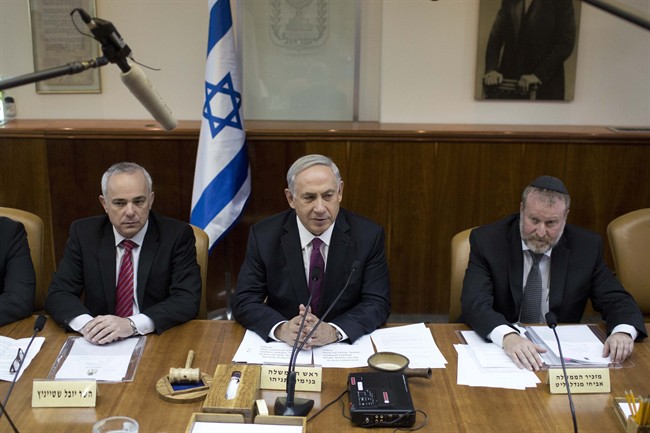JERUSALEM – Israel’s prime minister vowed not to change worship arrangements at Jerusalem’s most sacred and sensitive site Sunday and called for calm and restraint amid rising tensions in the holy city.

There have been almost daily clashes in east Jerusalem between Palestinian protesters and Israeli police in recent months, with much of the unrest focused on the city’s sacred compound revered by both Jews and Muslims.
It is the holiest site for Jews, who call it the Temple Mount because of the revered Jewish temples that stood there in biblical times; Muslims refer to it as the Noble Sanctuary and it is their third holiest site, after Mecca and Medina in Saudi Arabia.
Benjamin Netanyahu appealed for calm at his weekly cabinet meeting Sunday. “Since the days of Abraham, the Temple Mount has been the holiest site for our people and with this, the Temple Mount is also the most sensitive kilometre on earth,” Netanyahu said.
“Alongside our determined stance for our rights, we are determined to maintain the status quo for all the religions in order to prevent an eruption.”
Israel captured east Jerusalem – with its sites sacred to Jews, Muslims and Christians – from Jordan in the 1967 war. Palestinians are demanding the territory for their future capital. The fate of area is an emotional issue for Jews and Muslims and its future lies at the heart of the conflict between Israel and the Palestinians.
Last week in Jerusalem, a Palestinian gunman on a motorcycle shot and seriously wounded a U.S.-born activist who was a leading voice in expanding Jewish prayer rights on the hilltop complex. Muslim worshippers view Jewish prayer at the site as a provocation, and Israeli authorities place tough restrictions on it.
Israel has accused Palestinian President Mahmoud Abbas, who has called for banning Jews from the holy site, of inciting the violence.
“It is very easy to ignite a religious fire but much harder to extinguish it,” Netanyahu said Sunday.
Moshe Feiglin, a lawmaker from Netanyahu’s Likud party, visited the site without incident earlier in the day.
East Jerusalem has experienced unrest since the summer, with Palestinian youths throwing stones and firebombs at motorists and clashing frequently with Israeli police. The violence gained steam last month, when a Palestinian motorist rammed his car into a crowded train station, killing a 3-month-old Israeli-American baby girl and a woman from Ecuador.
Israel approved an amendment to the penal code Sunday that would enforce tougher punishment – up to 20 years in prison – for Palestinians that throw rocks at cars.
Earlier, Israel shut its crossings with the Gaza Strip except for humanitarian aid after militants fired rockets into its territory over the weekend.
It said it was the second-such rocket fired at Israel since the end of the 50-day Gaza war this summer with Hamas. The military says the two rockets exploded in open fields and caused no injuries.
The Egyptian army recently forcibly evacuated hundreds of Egyptian families living along the border with the Gaza Strip in order to create a buffer zone, designed to stop the smuggling of militants and weapons through underground tunnels.
- Alberta to overhaul municipal rules to include sweeping new powers, municipal political parties
- Norad looking to NATO to help detect threats over the Arctic, chief says
- Grocery code: How Ottawa has tried to get Loblaw, Walmart on board
- Military judges don’t have divided loyalties, Canada’s top court rules



Comments